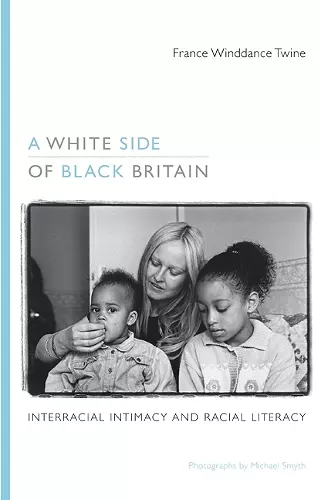A White Side of Black Britain
Interracial Intimacy and Racial Literacy
Format:Hardback
Publisher:Duke University Press
Published:8th Feb '11
Currently unavailable, and unfortunately no date known when it will be back

Focuses on the struggles of white mothers parenting African-descent children in Britain, analyzing the complex, racialized status of these women and their commitments to antiracism
An ethnographic analysis of the racial consciousness of white transracial women who have established families and had children with black men of African Caribbean heritage in the United Kingdom.A White Side of Black Britain explores the racial consciousness of white women who have established families and had children with black men of African Caribbean heritage in the United Kingdom. Filling a gap in the sociological literature on racism and antiracism, France Winddance Twine introduces new theoretical concepts in her description and analysis of white “transracial” mothers raising their children of African Caribbean ancestry in a racially diverse British city. Varying in age, income, education, and marital status, the transracial mothers at the center of Twine’s ethnography share moving stories about how they cope with racism and teach their children to identify and respond to it. They also discuss how and why their thinking about race, racism, and whiteness changed over time. Interviewing and observing more than forty multiracial families over a decade, Twine discovered that in most of them, the white woman’s racial consciousness and her ability to recognize and negotiate racism were derived as much from her relationships with her black partner and his extended family as from her female friends. In addition to the white birth mothers, Twine interviewed their children, spouses, domestic partners, friends, and members of their extended families. Her book is best characterized as an ethnography of racial consciousness and a dialogue between black and white family members about the meaning of race, racism, and whiteness. It includes intimate photographs of the family members and their communities.
“By building her argument through images, as well as statistics and anecdotes, Twine opposes nearly a century of prejudice against visual evidence within sociology. . . . A White Side of Black Britain . . . seems destined to become a landmark in the field. . .” - Charles Donelan, Santa Barbara Independent
“Twine is also an expert storyteller, and it is through the book’s richly detailed stories that she demonstrates the importance of researching transracial intimacy to gain a better understanding of race, class, and gender, along with nationalism and ethnic tensions. . . . The research strategies and microsociological dynamics that Twine has identified in this book will undoubtedly prove essential for any scholar undertaking such difficult and valuable projects.” - Erik Love, Jadaliyya
“France Windance Twine’s A White Side of Black Britain is a lovely and
important book. It is lovely because it is carefully researched, finely
crafted, and illustrated with compelling photographs that add dimension
to the study and its methodology. It is important because its ethnographic
focus on white women’s participation in British multiracial families gives
it an extraordinary vantage point from which to explore the everyday
constitution and contestation of racial borders, boundaries, and identities
along the double axis of class and gender.” - Elizabeth Long, American Journal of Sociology
“A White Side of Black Britain raises important questions such as how white women are raising children as members of black–white interracial families, what meanings are attributed to their whiteness and how class inequality, gender regimes and prescriptions for respectable femininity mediate the ways that white women are evaluated in transracial families. The way in which Twine features and captures the conversations in the book through
language and illustrations make the book appealing to a range of audiences.” - Victoria Showunmi, European Journal of Women’s Studies
“A White Side of Black Britain is likely to become a landmark text in the fields of ‘mixed race’ and whiteness studies. France Winddance Twine offers a sympathetic and generous treatment of a complex and fraught subject, and she combines compelling, intimate vignettes and photos with nuanced analysis and thought-provoking links to contemporary debates.”—Claire Alexander, author of The Art of Being Black
“What happens to the racial consciousness of white women who marry black men and have black children? France Winddance Twine reveals through a deep and extensive ethnography with more than forty white women in such relationships how their consciousness changes, allowing them to become sensitive and adept at recognizing and dealing with racism. This is truly original research that deserves a wide readership.”—Eduardo Bonilla-Silva, author of Racism without Racists
“A White Side of Black Britain raises important questions such as how white women are raising children as members of black–white interracial families, what meanings are attributed to their whiteness and how class inequality, gender regimes and prescriptions for respectable femininity mediate the ways that white women are evaluated in transracial families. The way in which Twine features and captures the conversations in the book through language and illustrations make the book appealing to a range of audiences.” -- Victoria Showunmi * European Journal of Women's Studies *
“By building her argument through images, as well as statistics and anecdotes, Twine opposes nearly a century of prejudice against visual evidence within sociology. . . . A White Side of Black Britain . . . seems destined to become a landmark in the field. . .” -- Charles Donelan * Santa Barbara Independent *
“France Windance Twine’s A White Side of Black Britain is a lovely and important book. It is lovely because it is carefully researched, finely crafted, and illustrated with compelling photographs that add dimension to the study and its methodology. It is important because its ethnographic focus on white women’s participation in British multiracial families gives it an extraordinary vantage point from which to explore the everyday constitution and contestation of racial borders, boundaries, and identities along the double axis of class and gender.” -- Elizabeth Long * American Journal of Sociology *
ISBN: 9780822349006
Dimensions: unknown
Weight: 757g
328 pages